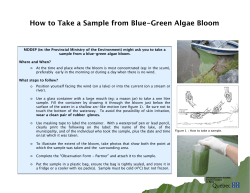
landowner questionnaire - Peoples Trust for Endangered Species
Dear Landowner/Manager People’s Trust for Endangered Species National Water Vole Monitoring Programme Water voles have undergone one of the most serious declines of any wild British mammal during the last century. Two National Surveys in the 1990s detected that in just seven years water vole numbers plummeted by almost 90%. To find out what has happened since then the People’s Trust for Endangered Species is launching the first ongoing National Water Vole Monitoring Programme (NWVMP) across England, Scotland and Wales. We have selected more than 800 sites across England, Scotland and Wales that were surveyed during the two National Surveys in the 1990s that we would like volunteers to re-survey and continue to monitor each year. At each site volunteers will walk a continuous 500m length of waterway bank looking for any water vole field signs once a year in May. We will also be asking volunteers to record any field signs of mink and otter they encounter along their survey route. This survey should take between 45 mins and 1 hour. We would also like to find out some more information about the habitat and management of the site. We would appreciate it if you could take the time to fill in the attached questionnaire and return it to the freepost address at the bottom of page 2. This information will allow us to look at the effect of habitat and land management on the presence or absence of water voles. We can assure you that any personal details provided will be kept confidential. Further information about the programme and about water voles in general can be found on our website – www.ptes.org/watervoles. If you require any further information please do not hesitate to contact us. Many thanks for your help, Emily Thomas, NWVMP Coordinator watervoles@ptes.org 020 7498 4533 People’s Trust for Endangered Species, 3 Cloisters House, 8 Battersea Park Road, London SW8 4BG www.ptes.org enquiries@ptes.org 020 7498 4533 Registered charity no: 274206 National Water Vole Monitoring Programme landowner questionnaire Contact name/s: ……………………………………………………………………………………………………………………………….. Address: …………………………………………………………………………………………………………………………………………….. ……………………………………………………………………………………………………………………………………………………………. ……………………………………………………………………………………………………………………………………………………………. Telephone: ………………………………………………………………………………………………………………………………………… email: ………………………………………………………………………………………………………………………………………………… Site number: ……………………………………………………………………………………………………………………………………… OR OS grid reference: ……………………………………………………………………………………………………………………….. 1. Habitat the site is in: Upland ☐ ☐ Lowland ☐ Coastal 2. Waterway type: ☐ pond ☐ river stream/burn ☐ ☐ canal ☐ reservoir ☐ lake/loch ☐ ditch/dyke ☐ ☐ other ☐ reed bed marsh bog ☐ If other please specify: ……………………………………………… 3. Land use bordering the waterway (tick all that apply): ☐ Conifer woodland ☐ Peat bog ☐ Arable crop ☐ Urban/industrial ☐ Park/garden ☐ Fen ☐ Upland grass ☐ Permanent/temporary grass ☐ Heath ☐ Mix/broadleaf woodland Salt marsh ☐ 4. Current speed of the waterway (tick all that apply): Rapid ☐ Fast ☐ Slow ☐ Sluggish ☐ Static ☐ 5. Width of the waterway (tick all that apply): 1m ☐ 1-2m ☐ 2-5m ☐ 5-10m ☐ >40m ☐ Tall grass/herbs ☐ 20-40m ☐ 6. Mean depth of waterway (tick all that apply): 0.5m ☐ 0.5-1m ☐ 1-2m ☐ >2m ☐ 7. Vegetation cover along the banks (tick all that apply): Bankside trees ☐ Shrubs ☐ Short grass/herbs ☐ People’s Trust for Endangered Species, 3 Cloisters House, 8 Battersea Park Road, London SW8 4BG www.ptes.org enquiries@ptes.org 020 7498 4533 Registered charity no: 274206 8. Are the banks treated in any way? Canalised ☐ Maintained ☐ ☐ Wild 9. Does weed control happen along the waterway? Mechanical ☐ Chemical ☐ None ☐ 10. Are there mink present on this waterway? Yes ☐ ☐ No In the past but not currently ☐ Don’t know ☐ 11. If there are mink present/they have been present, does/did any mink control happen along the waterway? Yes, currently ☐ Yes, in the past ☐ No ☐ Don’t know ☐ 12. Have you seen water voles on your land in the last: Year ☐ 5 years ☐ 10 years ☐ 15 years ☐ Other ☐ Never ☐ 13. Have water voles ever been reintroduced onto this waterway? Yes ☐ No ☐ Don’t know ☐ If yes please specify: ………………………………………………………………………… If you would like to receive updates about the NWVMP, please tick the boxes below: I am happy to be contacted about the NWVMP: by email ☐ by post ☐ People’s Trust for Endangered Species (PTES) would also like to keep your informed about our other work. We will never share your data with third parties I would like to receive emails from PTES ☐ I would like to receive SMS text messages from PTES ☐ ☐ I would not like to be contacted by telephone from PTES ☐ I would not like to receive postal communications from PTES Please visit our website www.ptes.org/watervoles for further information about water voles. Thank you for your time and help. Please return your completed form to the freepost address below: National Water Vole Monitoring Programme People’s Trust for Endangered Species FREEPOST RTJH-RBLR-AJCS 3 Cloisters House 8 Battersea Park Road London SW8 4BG Survey information will be placed in the public domain and will be shared, in summary form, with other environmental organisations. This information will NEVER include your contact details People’s Trust for Endangered Species, 3 Cloisters House, 8 Battersea Park Road, London SW8 4BG www.ptes.org enquiries@ptes.org 020 7498 4533 Registered charity no: 274206
© Copyright 2025











